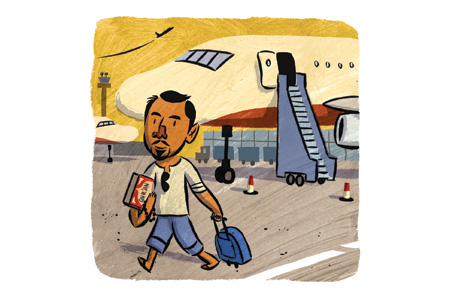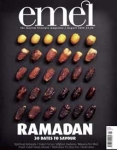
Middle England
Issue 59 August 2009
I was driven over to Suffolk, a small, pretty town in the South East of England for an event organised by the local community to discuss multi-cultural Britain. The programme included meeting local people, the mayor, local MPs and other local leaders, as well as a lecture.
There were around 400 local people who had registered for the event. People from all walks of life were there, from young students to pensioners. I was welcomed onto the stage and introduced as the key note speaker. As I stood up to deliver my lecture and looked around, I realised I was the only non-white person in the hall. That did not unnerve me at all but it certainly made me think about how interesting a discussion on the diversity of Britain would be that day. I spoke at length about the changing face of the UK; I asserted that while Britain was fast changing with the arrivals of communities from all over the world, it may seem to some that its white Anglo Saxon culture and heritage is being permanently lost or altered. I did not believe that was true.
The arrival of immigrant communities in the British Isles has always been normal for the UK. Hundreds of years of many cultures merging and evolving together has in fact created the modern Britain we have today. I told the audience that I was English and was proud of my identity. There was a slight murmur amongst the audience. One lady stood up in protest and said politely, “Young man, you are not English, you are British and you should be proud of that!” I asked why she felt I was not English, and another person said, “You are not white, only white people are English”.
I remembered the same conversation 17 years back with my father. I once said to him that I was English and he nearly threw me out of the house. He too told me that I was not English and I was actually a Bangladeshi. He even said to me that the day would come when we, the ‘foreigners’, would be thrown out of this country and then we will be neither accepted by those countries of our ethnic origin nor accepted by those countries we had migrated to.
I argued my case even further saying “I am here to stay and no matter who said what, I am English, I am a Muslim and I am proud of my identity.” One of them told me that I should go back to where I come from and that will stop a lot of conflict. What was most alarming to me was that these were the educated middle class; they listen to BBC Radio 4, read The Telegraph, watch BBC News and were extremely successful. If they viewed the second and third generation of the immigrant communities in this way, I wonder how the working class viewed immigrants!
Over dinner with some of the local leaders, the discussion turned to the topic of Islam. It was a sore topic for most of them. They had a simple notion of Islam; it was an alien religion, practised by medieval Arabs in the desert who chopped the hands of thieves and stoned people to death for having sex outside marriage. There was no way I could have clarified any of these misconceptions over dinner but I was keen to hear them. I said in response that Islam was about serving justice between humans and God and their surroundings. Any action that goes against justice is seen as un-Islamic and any action by Muslims or non-Muslims serving justice is Islamic. I reminded them that Islam should not be judged by the behaviour of Muslims but Muslims should be judged by the measures of Islam.
Some of them were adamant that Britain was a Christian country and Islam had no official role here. There was a priest sitting not far away and he confirmed that this view is not based on a wish list drawn up by the clergy but the feeling of British people at large. When I pressed him on his knowledge of Islam’s contribution to the renaissance in Europe through arts and culture, science and technology and most importantly inductive knowledge he was not dismissive of this historic fact but was reluctant to give too much publicity to it. I wondered, if Ibn Rushd (Averroes) had not translated the works of Aristotle into Latin, what would the state of Europe be today!
I felt rather sad that all these struggles to integrate and create a cohesive society were not reaching many parts of UK. I told my hosts that unless more is done to challenge some of the ideas that I had encountered during the event, Britain can bid farewell to community cohesion. Despite my experiences, I remain resolute that we can create a shared world characterised by acceptance and respect regardless of our cultural, ethnic or religious backgrounds.
Bookmark this |
|
Add to DIGG |
|
Add to del.icio.us |
|
Stumble this |
|
Share on Facebook |
|
Share this |
|
Send to a Friend |
|
Link to this |
|
Printer Friendly |
|
Print in plain text |
|


Comments
1 Comment
1
Tsukasa
22 Feb 11, 00:01
salam.1stly,i want to say that i love all of ur articles.they're great and inspiring!
but the old lady has her point when she stressed that you are a British,but not an Englishmen.because Englishmen are literally peoples who belonged to Anglo-Saxon ancestry that had lived and originated from England.It's just a matter of their roots and race identities.It's same like here.In Malaysia we have various race:Malay,Chinese,Indians and others.But a Malay can never be a Chinese and vice versa.Despite the race differences,we are all Malaysian just as you and the Englishmen are British.It's the same concept.So maybe in your context,you want to promote more terms of acceptance from the European Community towards the Muslims there.but for me,if we want to be accepted and respected by them,we should also respect their identity and cultures.
A Malay would always be a Malay wherever they settled in.That gives me a sense of proud of my roots and culture.Don't you?
It's just my humble opinion. ; )